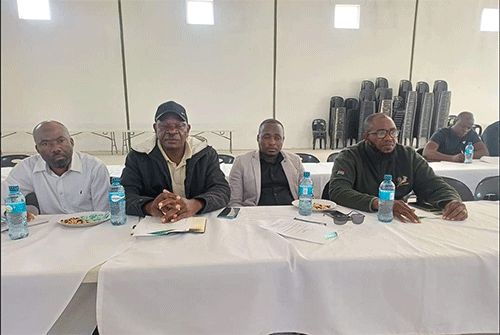The Development Bank of Namibia (DBN) has been instrumental in developing serviced land for a new community in Eenhana, the capital of the Ohangwena region. Established as a town in 1999, Eenhana is one of the country’s fastest-growing towns. For this reason, serviced land is essential to ensure the local population can continue to grow while reaping benefits of socio-economic development.
The development of serviced land in Portion 5 of Eenhana was undertaken through a public-private partnership (PPP) consisting of the Eenhana Town Council, a joint venture between developer Ino Investment Holdings and consulting engineers Lithon Project Consultants, and financier Development Bank of Namibia. The PPP was the first of its kind, and serves as a model for ongoing and future development of serviced land. Speaking about the project, DBN CEO Martin Inkumbi said the requirements were complex, and benefited from multifaceted expertise.
Among the works undertaken were the establishment of gravel roads, sleeving for telecommunications infrastructure, water mains and connections to the erven, sewage reticulation, an underground electricity system and infrastructure to lead away stormwater. Following planning by Lithon Project Consultants, the works were undertaken by Ino Investments, using contractors.
Land was made available by the Eenhana Town Council. The project made provision for 151 residential erven on which 151 single houses can be built, and eight general erven on which blocks of apartment units can be built. Two civic erven on which public spaces, playgrounds and/ or sports grounds could be built, were provided for. One erf was allocated for business, and another two were provided for government institutions.
On the topic of developmental qualities of the community, Inkumbi said not only does the land have to be suitable for construction through a full range of services, but the entire community has to be planned to make it socially sustainable. Hence the requirement for civic erven for recreation and business erven to allow for retail facilities and potential employment opportunities within the community.
The benefit for Eenhana is that the town will be able to attract and keep residents through the provision of better land and municipal services. This, in turn, makes the town more attractive to enterprises, which in turn will attract more residents. At the same time, the Eenhana Town Council earns income from rates and taxes, which enables it to maintain municipal services as well as service more land and grow the extent of the town.
Inkumbi expressed satisfaction and pride in the model and the learnings. The model is sustainable, the development benefits are clear, and the finance is determined by sales. He observed that this will be opening the door to stakeholders from local authorities and developers to consult the Bank on means to facilitate serviced land.



